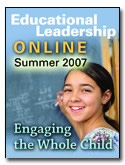A project for an online American history course focused on World War II—as seen through both U.S. and Japanese eyes. Interacting through videoconferencing and e-mail, students in Florida and Japan discussed the Japanese-American internment and their countries' current relationship. Florida high school students studying Japanese served as interpreters. Guest speakers, such as a Japanese internment camp prisoner and a Holocaust survivor, shared their grueling stories. To conclude the project, students demonstrated understanding of curriculum themes through sophisticated multimedia presentations.
Because the project incorporated specific components in its instructional design, delivery, and implementation, online learning promoted students' acquisition of important 21st-century skills—such as global awareness, self-directed learning, technology literacy, and skills in problem solving and time management. In a recent report titled Virtual Schools and 21st Century Skills, the North American Council for Online Learning and the Partnership for 21st Century Skills identify ways in which online learning can increase education excellence for all students as it prepares them for a successful life in school and beyond.
- Global awareness: Students can easily work with individuals from all over the world. For example, the Michigan Virtual High School offers an online Chinese language course taught by a qualified native speaker. The course is designed around four components: an e-textbook, a group problem-solving project, Internet protocol (IP)-based audio conferencing and discussion, and a group writing project.
- Self-directed learning: Virtual schools empower students to make flexible, individual choices on the basis of their interests and schedules. At Florida Virtual School, students choose the length of their study program, which can be shorter or longer than the traditional 36-week school year. Students may choose when and where they complete their assignments, but they must deliver an end product by a given date. The report points out that this approach is similar to many business environments today, “where telecommuting and virtual offices are a reality, but accountability and quality expectations for the end product remain high.”
- Information and communications technology literacy: Students learn 21st-century technology skills as they collaborate and communicate online. They become adept at using applications common to today's business environment, such as Web-based conferencing, project management tools, and digital media and communications tools.
- Problem-solving skills: Virtual schools focus on competency-based learning models that engage students in collaborative practices. In Florida Virtual School, students study geometry by learning real-world architectural skills. After familiarizing themselves with plans and blueprints, students draw the façade of a house and learn about such terms as slope and pitch as they relate to local buildings.
- Time management and personal responsibility: Students learn self-discipline as they manage their time and responsibilities online.
The report suggests that online courses must not only teach 21st-century skills but also include these skills as outcomes to assess. Virtual Schools and 21st Century Skills is available atwww.nacol.org/docs/VSand21stCenturySkillsFINALPaper.pdf.


